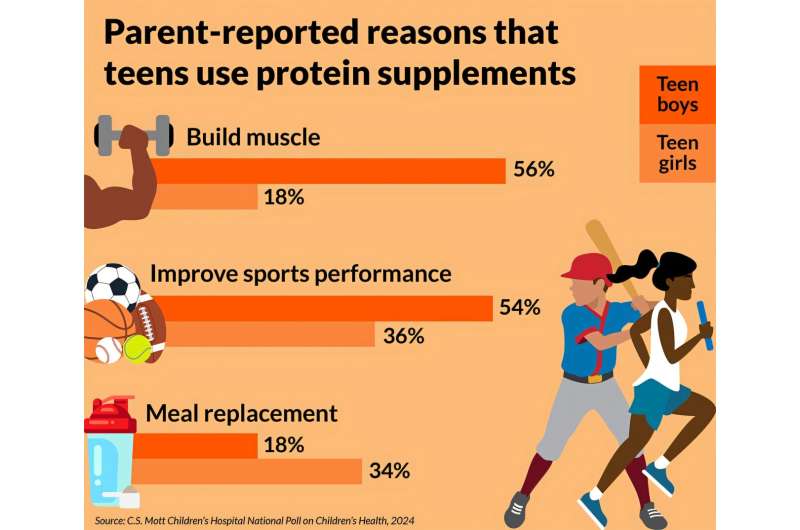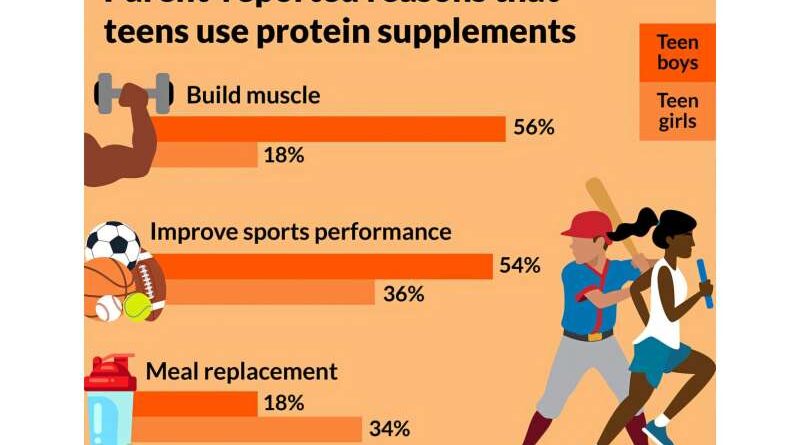National survey: Many young people use proteins that contribute to muscle growth, sports performance

Many parents say their teens use protein supplements to boost muscle growth and athletic performance. Credit: Sara Schultz, University of Michigan Health CS Mott Children’s Hospital National Child Health Poll
Protein bars, shakes and powders are still very popular among adults – but many young people may be jumping on the bandwagon too.
Two in five parents say their teen has taken protein supplements in the past year, according to the University of Michigan Health CS Mott Children’s Hospital National Poll on Children’s Health. The practice was more common among teenage boys who may also take protein supplements every day or most days, parents reported.
“Protein is part of a healthy diet but it can be difficult for parents to know if their child is eating the right amount,” said Mott Poll co-author Sarah Clark, MPH.
“Our research highlights that many young people use protein supplements, especially protein powders, to improve their sports performance and build muscle.”
Using protein supplements for muscle growth, sports
Parents of boys were more likely to say their teen was consuming protein to support muscle growth and for sports training, while girls were more likely to use it as a meal replacement when they were busy or they help with a balanced diet.
About one in 10 parents also indicated that their teen uses protein supplements to help with weight loss, a commonly reported trend among parents of teenage girls.
Before turning to protein supplements, it’s best for parents and teens to think about what they want to achieve, Clark notes. In most cases, teenagers can get enough protein by eating a balanced diet. A consultation with an adolescent’s primary care provider or nutritionist can provide insight into whether protein supplements may be helpful, and if so, guidance on which products will best suit your goals. youth.
“Despite what some young people – and their parents or trainers – think, eating more protein than your body needs will not result in bigger or faster muscle gains, ” he said. “Instead, it helps to eat the recommended amount of protein spread throughout the day, at meals and snacks.”
Choosing wisely
When busy teens have less time to eat, well-intentioned parents may substitute foods they believe are healthy. However, parents should not assume that products labeled as high in protein are a healthy choice.
“Many protein shakes and bars have a lot of added sugar and caffeine that aren’t healthy for young people,” Clark said. “Parents should help teens read protein supplement labels and choose healthy options, such as those that contain fiber, with little or no added sugar.”
“Relying on protein shakes and bars may not provide the necessary vitamins, minerals and fiber; they are not intended to replace a balanced diet.”
Monitoring whether young people are getting enough protein
Most parents think their teen’s protein intake is insufficient, with nearly one in five saying their child isn’t getting enough, suggests a national agency report that includes responses to from 989 parents of 13-17 year olds surveyed in August.
“Protein is an important part of our diet, as it helps build muscles, regulate hormones and support a healthy body,” Clark said.
The right amount of protein for an individual will vary by age, gender, weight and physical activity level, Clark says, and it can be difficult for parents to gauge whether a child is getting enough protein. they get the right balance.
Parents should consider a strategy to provide at least one source of protein at each meal and encourage teens to try a variety of protein-rich foods, including eggs, nuts, fish, lean meats, lentils and dairy products, he says.
Clark said: “Youths can generally get enough protein from a well-balanced diet. “There may be other situations where teenagers don’t eat a lot of protein. In these cases, parents may sometimes consider proteins or protein supplements as part of a plan to increase the protein production of young people.”
Modeling a balanced diet
Adults’ attitudes and behavior toward protein supplements may affect children.
High-protein, low-carb diets are popular with most adults, and more than half of parents also think high-protein diets are healthy for their teens. However, they are not recommended to eat a high-protein diet as there is a risk that they may miss out on other important nutrients, including carbohydrates.
One in three parents also said they used protein supplements themselves—these parents were more likely to report that their teen also used them.
Parents should use the same approach as their teenagers, Clark says. In general, it is better to get enough protein through nutritious food, and if protein supplements are considered, they should choose products that contain fiber and other nutrients, without added sugar. or caffeine.
Offered by the University of Michigan
Excerpt: Country selection: More young people use protein supplements to build muscle, sports performance (2024, October 21) Retrieved October 21, 2024 from https://medicalxpress.com/news/ 2024-10-national-poll-teens-protein-supplements. html
This document is subject to copyright. Except for any legitimate activity for the purpose of private study or research, no part may be reproduced without written permission. Content is provided for informational purposes only.
#National #survey #young #people #proteins #contribute #muscle #growth #sports #performance
